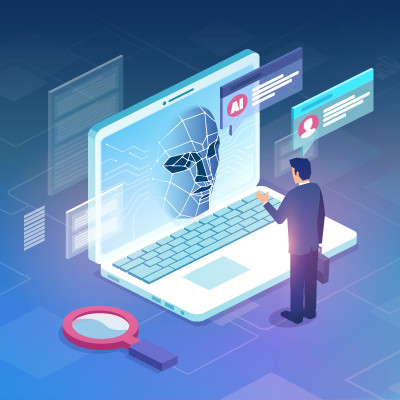Managing a budget is difficult, let alone budgeting for something as complicated as your IT infrastructure. Even though IT is notoriously difficult to budget for, it still continues to grow as a priority for organizations. How can you ensure that your budget can keep up with the projected expenses of your IT in the next several years?
Databit Blog
You don’t need us to remind you that running a business can be incredibly stressful. This stress comes from all kinds of factors, whether it concerns your staff, your management, or even your customers. However, if left unchecked, friction between your various internal forces can have negative consequences on your operations.
Artificial intelligence's transformative potential is no longer just available to enterprise businesses. Now small businesses are increasingly using the technology to enhance efficiency, improve customer experiences, and drive innovation for the betterment of an organization. Today, we start to explore three popular ways in which small businesses use AI to refine the way they do business.
The cloud comes in a few different forms. You have private cloud solutions, which are those that a business maintains in-house for their own use, and you have public cloud solutions, which are those that an external business hosts and provides to subscribers. While both have their place in modern business operations, we wanted to take a few moments to focus on the public cloud and the various benefits that it has to offer.
There are certain unspoken rules of doing business, one of which is that technology allows for innovation in various capacities to the point of making older, more traditional ways of doing business obsolete. If you properly use technology, you can improve your business' operations. Let’s look at three ways technology drives innovation in the business world.
Opening a new location is an exciting event for any business, but it's not without a litany of difficult decisions to make. One thing is certain, challenges always emerge. One thing you can do is plan your technology needs strategically to avoid headaches in that arena. Today, we take a look at how to best get your new location outfitted with the technology it needs to succeed.
Technology is undeniably important for the future success of your business, but one thing that is continuously overlooked is if the technology that you bring is actually right for your business. Today, we will look at some of the technology that businesses use that can actually have a negative effect on your business’ effectiveness.
Businesses are increasingly reliant on technology, and effectively managing IT support costs has become crucial. With approximately three to six percent of a company's revenue allocated to technology expenses, exceeding the monthly budget can have adverse repercussions on the ability to allocate funds elsewhere.
Downtime in a business context can be considered a "business predator" because it can have detrimental effects on a company's operations, profitability, and overall success. Downtime refers to the period during which a business' critical systems, processes, or equipment are not functioning as intended. Here are some reasons why downtime is often seen as a threat to businesses.
Financial Impact
Downtime can result in significant financial losses. When key revenue-generating systems or production processes are unavailable, businesses may lose sales, incur extra expenses, or face penalties for failing to meet contractual obligations. Downtime can also prevent a business from pursuing new opportunities or responding to market changes. In a rapidly evolving market, missing out on opportunities can have long-term consequences, and can be the difference between business growth and stagnation.
Operational Impact
Downtime leads to decreased productivity as employees cannot perform their tasks efficiently. This results in wasted time, missed deadlines, and a drop in overall output. In cases where downtime is due to data loss or system failures, it can result in the loss of critical information, which can be difficult or impossible to recover. This can have severe consequences for businesses, especially when it comes to sensitive or irreplaceable data. Frequent downtime can demoralize employees who must deal with the frustration and stress of interrupted work. Low morale can lead to higher turnover rates and decreased employee engagement.
Customer Impact
Prolonged or frequent downtime can do significant damage to a company's reputation. Customers and partners may perceive the business as unreliable, which can be challenging to overcome. Also, these unfortunate companies may find it challenging to compete effectively in markets with companies that show better reliability.
If you struggle with downtime, you can do better. If you don’t, you need to ensure that continues. The IT professionals at Databit can help. We can introduce you to technologies and strategies that are designed specifically to reduce downtime and improve operational efficiency. Get a professional perspective by calling 201-529-8050 today.
The State of Maine in the United States has been the victim of a cyberattack.
That’s right, the whole state was hacked by a Russian hacking collective.
The state claims that over 1.3 million people’s personal information was compromised via an already known vulnerability in secure transfer service MOVEit Transfer. Unfortunately for the people of Maine, this vulnerability is known to be used by the Cl0p ransomware gang, based out of Russia.
Business continuity is a tricky beast, and one that is best fought with proactive and preventative measures. The reason for this is simple: any situation where your business’ data is put at risk could mean the end, and we are not catastrophizing when we say that. Let’s look at two issues that are only small problems at the surface level, but could snowball into serious problems.
Managing your business efficiently requires judicious allocation of limited resources, encompassing budget, time, and the capabilities of your workforce. It is paramount to ensure their effective management. Let's delve into fundamental practices that can help you optimize the resources at your business' disposal.
Businesses that don’t leverage managed services for their technology infrastructure are leaving a lot of money on the table, but it’s not always easy to see until you break down what the solutions really do for you. In isolation, they might not seem valuable, but when combined, they save your business significant amounts of capital.
Without hardware, where would your business be right now? You can’t run your mission-critical applications and software without devices to host them on. You need to do all you can to ensure it stays in a proper state, but there will always eventually come a time when you cannot sustain it any longer and need to upgrade.
Here’s what you need to know about your hardware refresh cycle, including what it is, what you can do with one, and how to plan it out.
If you want your business to grow, then you’re going to have to get used to dealing with complex problems that require complex solutions. You can implement technology to make solving these challenges easier, but at the same time, you want to be careful that the solutions you implement are not going to get in the way of productivity. Today, we want to discuss good old-fashioned bureaucracy, and how while you might not want to build it into your strategy, it will probably happen anyway.
The challenges that remote work has presented employers for the past few years are being remedied, not by a full-scale return to the office, but with hybrid work strategies. These strategies promote both the return to the office and the retention of schedule flexibility for remote-capable workers. It is a compromise that is having eye-opening results.
Small manufacturers and distributors require a completely different set of conditions than your typical small business. Most small businesses just don’t have the resources at their disposal to properly address issues that surface. One way these organizations can improve the way they perform is through the use of a logistics platform.





















